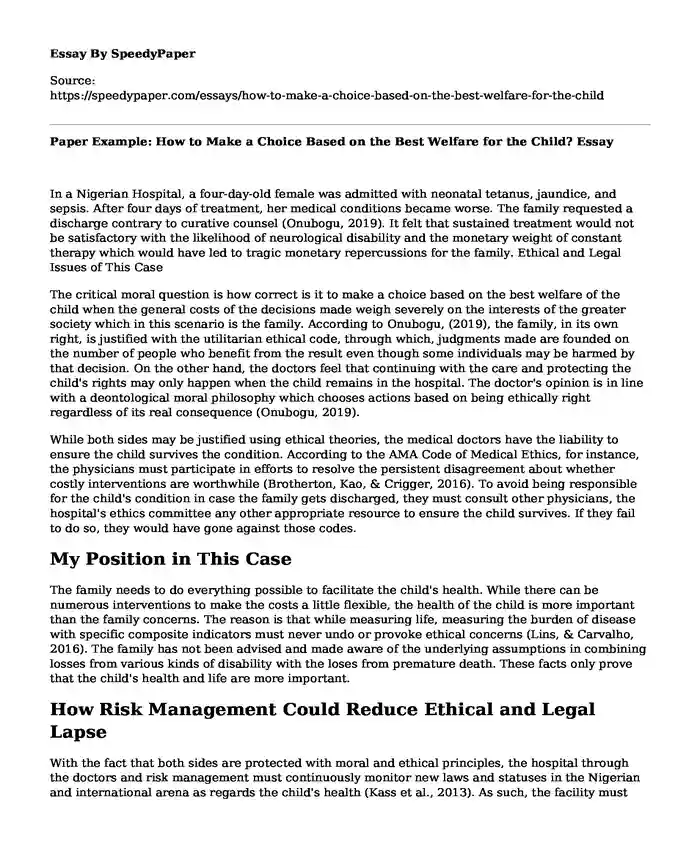
| Type of paper: | Essay |
| Categories: | Medicine Ethical dilemma Social issue |
| Pages: | 3 |
| Wordcount: | 766 words |
In a Nigerian Hospital, a four-day-old female was admitted with neonatal tetanus, jaundice, and sepsis. After four days of treatment, her medical conditions became worse. The family requested a discharge contrary to curative counsel (Onubogu, 2019). It felt that sustained treatment would not be satisfactory with the likelihood of neurological disability and the monetary weight of constant therapy which would have led to tragic monetary repercussions for the family. Ethical and Legal Issues of This Case
The critical moral question is how correct is it to make a choice based on the best welfare of the child when the general costs of the decisions made weigh severely on the interests of the greater society which in this scenario is the family. According to Onubogu, (2019), the family, in its own right, is justified with the utilitarian ethical code, through which, judgments made are founded on the number of people who benefit from the result even though some individuals may be harmed by that decision. On the other hand, the doctors feel that continuing with the care and protecting the child's rights may only happen when the child remains in the hospital. The doctor's opinion is in line with a deontological moral philosophy which chooses actions based on being ethically right regardless of its real consequence (Onubogu, 2019).
While both sides may be justified using ethical theories, the medical doctors have the liability to ensure the child survives the condition. According to the AMA Code of Medical Ethics, for instance, the physicians must participate in efforts to resolve the persistent disagreement about whether costly interventions are worthwhile (Brotherton, Kao, & Crigger, 2016). To avoid being responsible for the child's condition in case the family gets discharged, they must consult other physicians, the hospital's ethics committee any other appropriate resource to ensure the child survives. If they fail to do so, they would have gone against those codes.
My Position in This Case
The family needs to do everything possible to facilitate the child's health. While there can be numerous interventions to make the costs a little flexible, the health of the child is more important than the family concerns. The reason is that while measuring life, measuring the burden of disease with specific composite indicators must never undo or provoke ethical concerns (Lins, & Carvalho, 2016). The family has not been advised and made aware of the underlying assumptions in combining losses from various kinds of disability with the loses from premature death. These facts only prove that the child's health and life are more important.
How Risk Management Could Reduce Ethical and Legal Lapse
With the fact that both sides are protected with moral and ethical principles, the hospital through the doctors and risk management must continuously monitor new laws and statuses in the Nigerian and international arena as regards the child's health (Kass et al., 2013). As such, the facility must ensure that it complies with those requirements and evaluates trends within and outside to minimize the likelihood of adverse events. Of any decisions it takes, the objectives should be in line with their oaths and a focus to do the right thing.
Reflection
Even though the parents have a valid point regarding their financial position, their child's life lies in their hands, and I believe it is the most important thing. I would approach this matter very honestly and openly if I have to save the hospital's reputation and save the child (Card, 2014). What the family lacks is belief and trust in the health system, which may be approached by the conscientious objection (CO) (Saad, & Jackson, 2018). Using this in the positive ways would create a moral safety valve with which the child's rights can be strongly enhanced and the loss assessed. Losing other value and property is better than losing the child.
References
Brotherton, S., Kao, A., & Crigger, B. J. (2016). Professing the values of medicine: the modernized AMA Code of Medical Ethics. Jama, 316(10), 1041-1042.
Card, R. F. (2014). Reasonability and Conscientious Objection in Medicine: A Reply to Marsh and an Elaboration of the ReasonGiving Requirement. Bioethics, 28(6), 320-326.
Kass, N. E., Faden, R. R., Goodman, S. N., Pronovost, P., Tunis, S., & Beauchamp, T. L. (2013). The researchtreatment distinction: a problematic approach for determining which activities should have ethical oversight. Hastings Center Report, 43(s1), S4-S15.
Lins, L., & Carvalho, F. M. (2016). SF-36 total score as a single measure of health-related quality of life: Scoping review. SAGE open medicine, 4, 2050312116671725.
Onubogu, U. C. (2019). A clinical case study that raised ethical issues in a developing country.
Saad, T. C., & Jackson, G. (2018). Testing conscientious objection by the norm of medicine. Clinical Ethics, 13(1), 9-16.
Cite this page
Paper Example: How to Make a Choice Based on the Best Welfare for the Child?. (2023, Feb 16). Retrieved from https://speedypaper.net/essays/how-to-make-a-choice-based-on-the-best-welfare-for-the-child
Request Removal
If you are the original author of this essay and no longer wish to have it published on the SpeedyPaper website, please click below to request its removal:
- Free Essay Comprising Nursing Education Research
- Free Essay: Multimodal Analysis Theory on the Example of Shawshank Redemption
- Free Essay Sample: Money as a Motivator
- Paper Example of Annotated Bibliography on Rationalism and Empiricism
- Essay Example on Chinese Architecture and Culture
- Essay Example. Strategic Corporate Communication - Healthcare
- Essay Sample on How Administrators Can Develop an Education Attainment Policy
Popular categories




